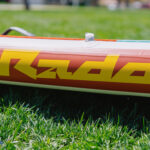Hala Gear Rado iSUP Review
Pros
- Flatter midsection improves stability, capacity, and efficiency
- High quality construction and materials for reliable use on whitewater year after year
- StompBox fin system allows you to use a larger fin that retracts into the board on impact
- Highly versatile design for rivers Class II-IV
- Plenty of cargo space with additional rigging points
- 5-year warranty and excellent customer service
Cons
- Does not come with a paddle, however Hala’s paddles are great for use on the river
- Is not as agile as Hala’s other whitewater SUPs for more technical whitewater
Hala’s Rado is a super-stable whitewater board ideal for multi-day river trips with Class III+ whitewater.
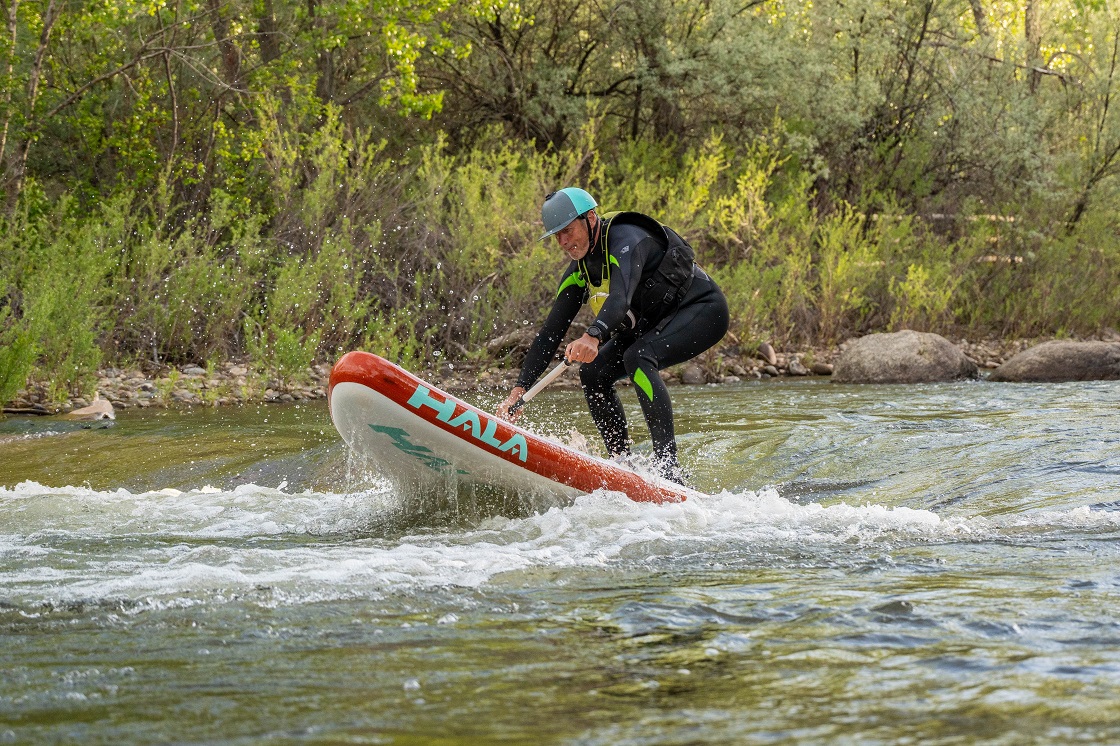
The Hala Rado is a whitewater SUP that has no competition. This is a larger board that’s built to handle more than just big waves and drops, but to do it while fully-loaded for multi-day trips. It’s incredibly stable, tracks so well that it might even be too easy to paddle straight at times, and is built for the rigors of the river.
Larger paddlers (both in height and weight) will appreciate the extra size and stability from the Rado’s shape and rocker profile, but smaller paddlers may struggle with maneuvering the board both on and off the water.
We think the Hala Rado would be a great SUP for:
- Beginner whitewater paddlers over 250 pounds
- Intermediate and Advanced paddlers of all sizes on multi-day, self-supported whitewater river trips
Hala Rado: Spec Sheet
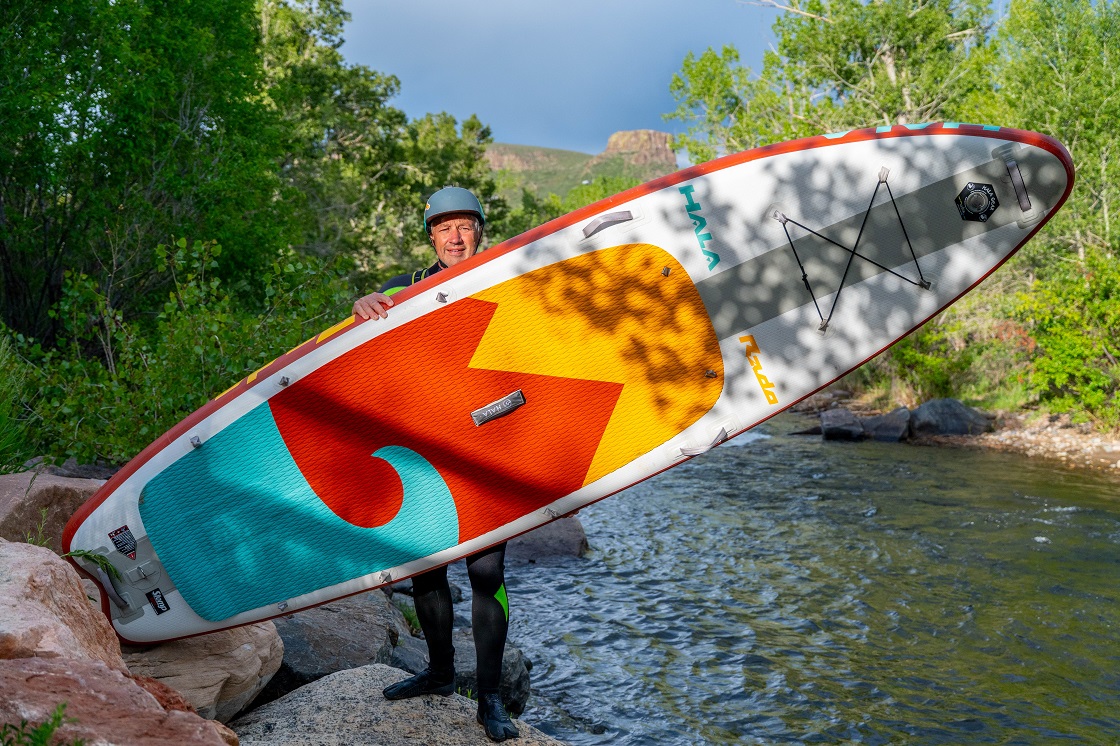
- Board Categories: Whitewater / Rivers Class II+
- Listed Board Dimensions: 10’10” x 35 x 6”
- Measured Board Dimensions: 10’10” x 35.5” x 6 “
- Listed Board Weight: 28.5 lbs
- Actual Board Weight (board + fin box, inflated): 29.5 lbs
- Listed recommended capacity: 325 lbs
- Listed max capacity: None
- Recommended PSI: 18 psi
- Fins: Retractable flexi 9” dolphin center fin, plus 2 side fins.
- Paddle: Optional
- Board Shell Construction Materials: Double layer fusion, with welded rails
- Drop-stitch type: Woven
- Price Range: High
- Warranty: 30-day refund (unused), 5-year full warranty
Performance Review of the Hala Rado Stand Up Paddle Board
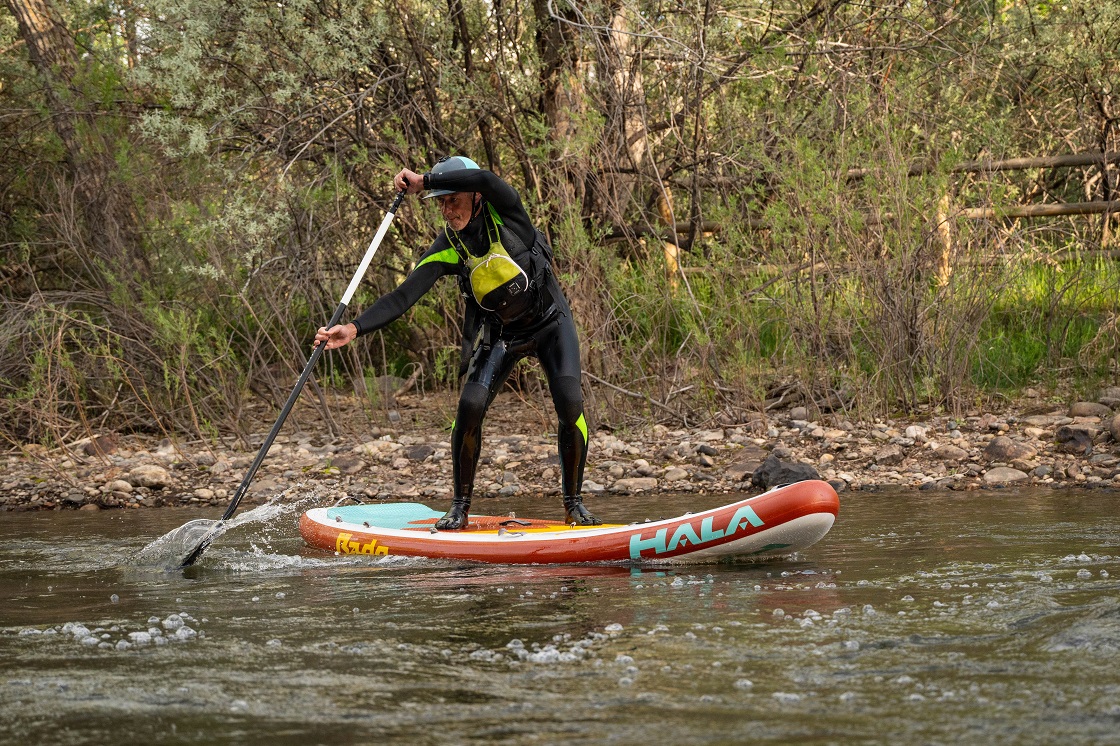
Overall Score: [9.5/10]
- Stability: 9.9/10
- Speed & Attaining: 9.8/10
- Agility: 9.2
- Waves & Drops: 9.3/10
- Construction Quality: 9.5/10
- Features/Accessories: 9.5/10
Since the Hala Rado is a highly specialized paddleboard, we’ve adjusted our rating system to reflect its performance compared to other whitewater SUPs rather than trying to squeeze it into our framework for reviewing all-around and other flatwater-designed boards.
Stability Rating: [9.9/10]
The stability score shown here is based on comparative performance to other whitewater paddleboards, rather than all paddleboards we’ve reviewed.
The Hala Rado provides superb stability for whitewater paddlers of all skill levels. The additional length and wide shape makes it easy to load up with equipment for longer trips without making the board feel twitchy or hard to handle.
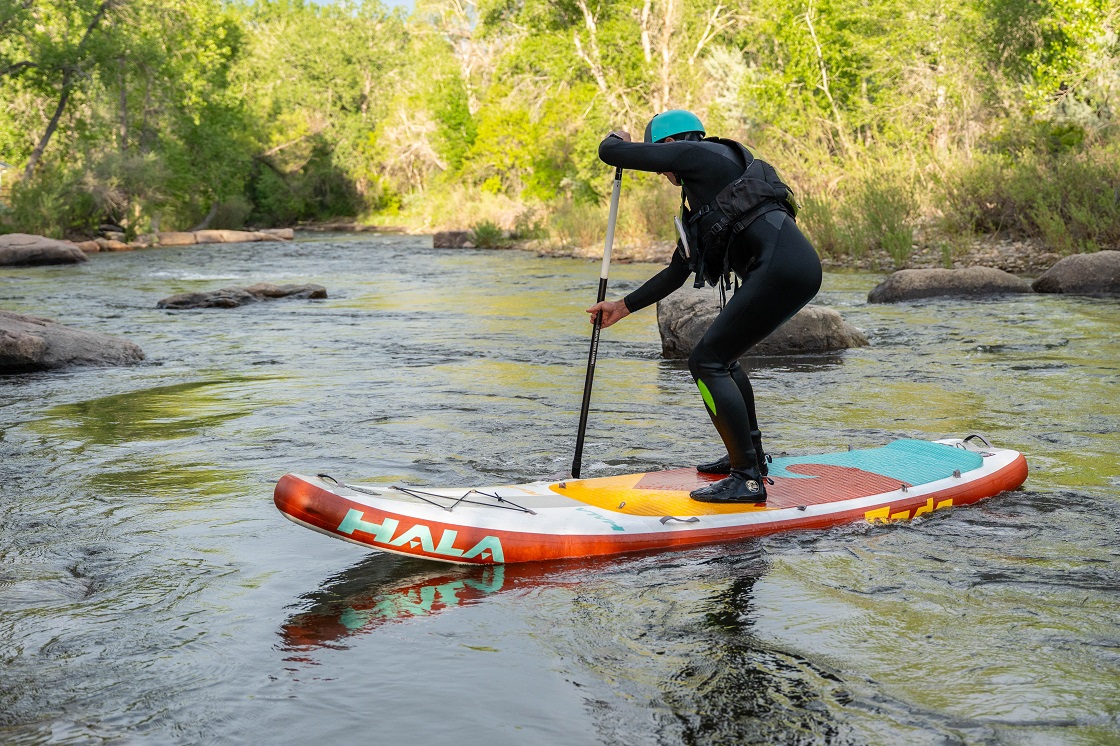
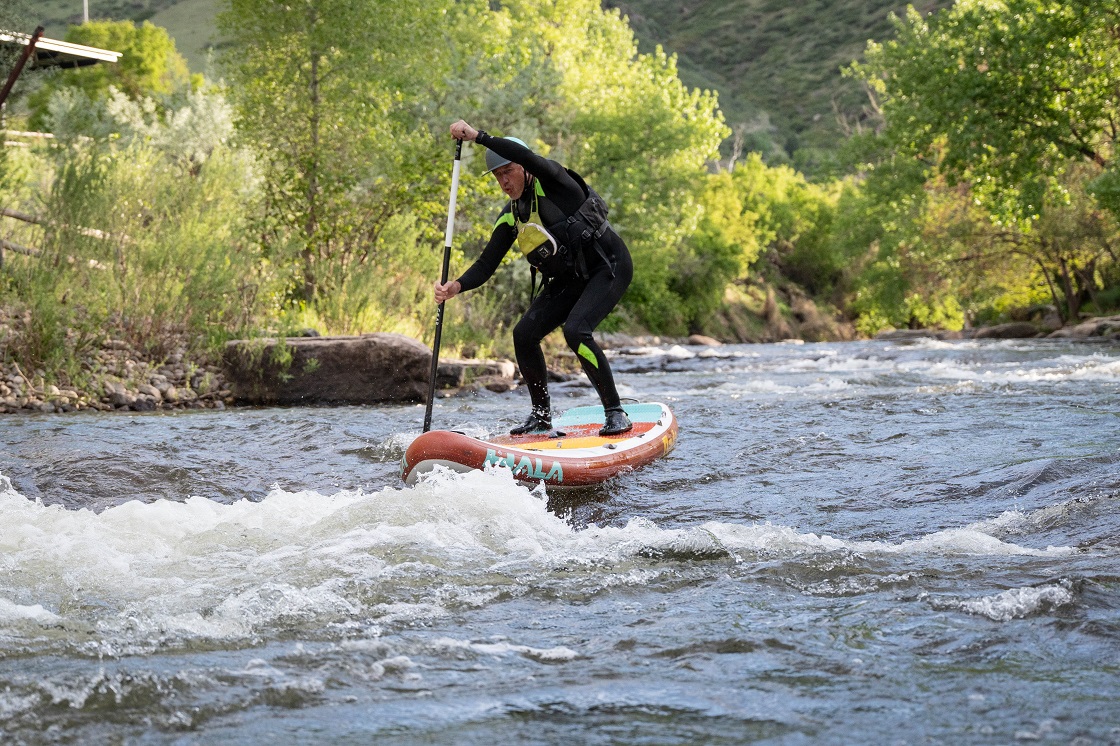
Maximum stability for a whitewater SUP. That’s how I would describe the Hala Rado. If you are a larger beginner whitewater paddler or plan to go on longer trips through bigger water, this is the right board for you. It’s actually a little hard to put this board on edge compared to Hala’s other whitewater boards.
But, when you are leaning hard to carve a turn or are teetering through a particularly swirly section of water, it’s the kind of stability you want. The Rado is ready to take you through big water, fully loaded. Neither myself, nor Bill, nor Brandon – our newer whitewater paddlers helping us test at the Clear Creek Whitewater park in Golden, CO, had any issues staying upright on the Rado.
Whether we were paddling flat, edging the board through a turn or across while ferrying, or stepping onto the tail for a pivot turn, the Rado remained stable and reliable throughout.
Speed & Attaining: 9.8/10
The score given above is a comparative rating to other whitewater paddleboards, but not in comparison to other types of SUPs.
Speed performance on a whitewater SUP is a little different compared to flatwater boards. You want fast acceleration to make quick moves and you need to be able to control the board speed, but typically you aren’t sustaining high paddling speeds for long periods of time.
Paddling speed
The Rado is an expedition whitewater board meant to help you paddle long distances while still handling heavy water and heavy cargo. Its longer and flatter middle and tail sections help the board stay straighter and carry more speed while paddling down river. It also helps you carry speed through river features like drops and waves without getting stopped by the sudden changes in elevation. This makes the Rado a great board for covering long miles on rivers where you also need to be able to handle that Class III+ whitewater.
Attaining Up River
Paddling up river can be a great workout, but it’s also an important skill as you progress in whitewater paddling. While the whitewater park doesn’t have any “must make” moves, wild rivers often do and can be the difference between passing safely and easily through a rapid or being in for an absolute wild ride (and not in the good way)! Moving back up the river allows you to reposition safely to line up for your run.
The same shape that gives us improved downriver paddling speed with the Rado also helps us attain upriver. The longer outline, 9” fin, and flatter mid section all help the Rado stay pointed upstream and allow you to focus on paddling upriver instead of constantly correcting to stay pointed up river. The Rado smoothly attains through mild and moderate current without getting spun back down stream or feeling like you are paddling on a treadmill.
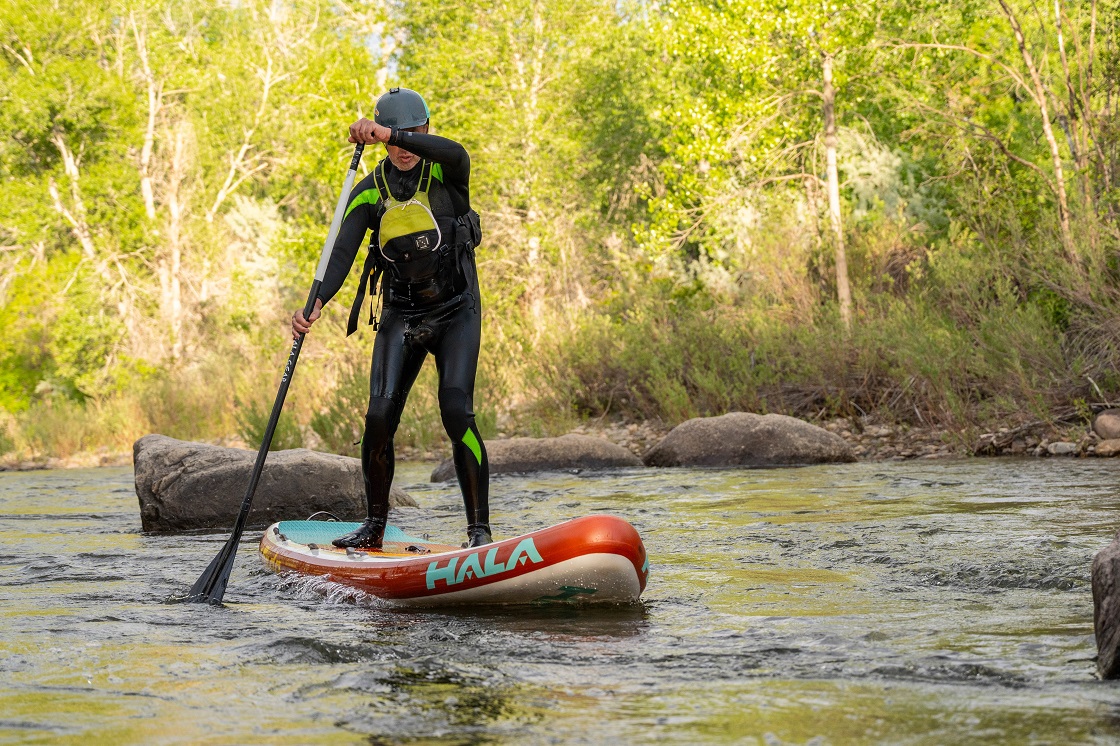
Overall
If you are looking for a whitewater-capable paddle board that is going to make river miles melt away, then the Hala Rado is the board for you. It paddles efficiently through the flats, carries its speed through rapids and waves, and attains easily when you need to reposition or move back upstream.
Agility: 9.2/10
Making tight maneuvers and controlled river crossings is a critical skill for any whitewater paddler and can be greatly impacted by board and fin design.
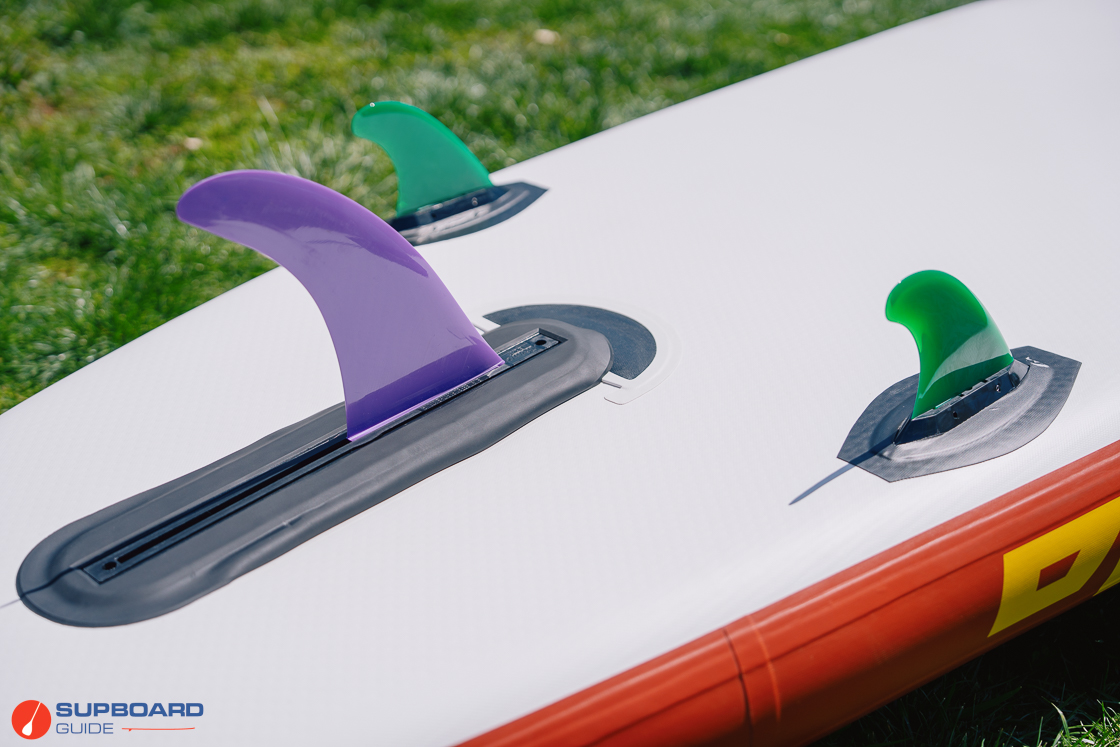
Turning
Here we’ve found the biggest snag with the Rado – it’s not nearly as agile on the water as Hala’s other whitewater SUPs like the Atcha 96 or even the Radito. The extra surface area on the water combined with a 9” center fin helps the Rado keep moving straight, but makes it much harder to turn quickly. The Rado also carries a lot of momentum and likes to drive through waves and drops, making it much harder to quickly catch eddies on either side of the feature. Stepping back to the tail and lifting the nose does let you spin the Rado quickly, but if you are loaded up for an overnight trip your gear will prevent you from stepping back. The slower turning performance of the Rado makes it less ideal for tight, technical whitewater, but does give it an edge in bigger whitewater situations where you need to maintain a specific line without getting turned around.
Ferrying
Ferrying is an important skill that, like attaining upstream, allows you to adjust your position on the river, but without moving downstream or upstream. By pointing upstream at the right angle and adjusting the tilt of your board, you can slide across the river with just a few paddle strokes to keep you moving.
What makes the Rado attain so well, but harder to turn does help maintain your line when crossing the current. Once you’ve set your ferry angle, the Rado motors across the current needing minimal adjustment.
Overall
The Hala Rado has relatively low agility for a whitewater SUP, but don’t confuse that with having low agility in general. The Rado is still a whitewater SUP designed for quick maneuvering on the river, it’s just not the most agile whitewater SUP. For multiday river trips the Hala Rado still has plenty of maneuverability to work your way through Class III+ rapids.
Waves & Drops: 9.3/10
You can’t have whitewater without gravity! How well a SUP handles sudden changes in elevation (both down and up) is vital for whitewater performance.
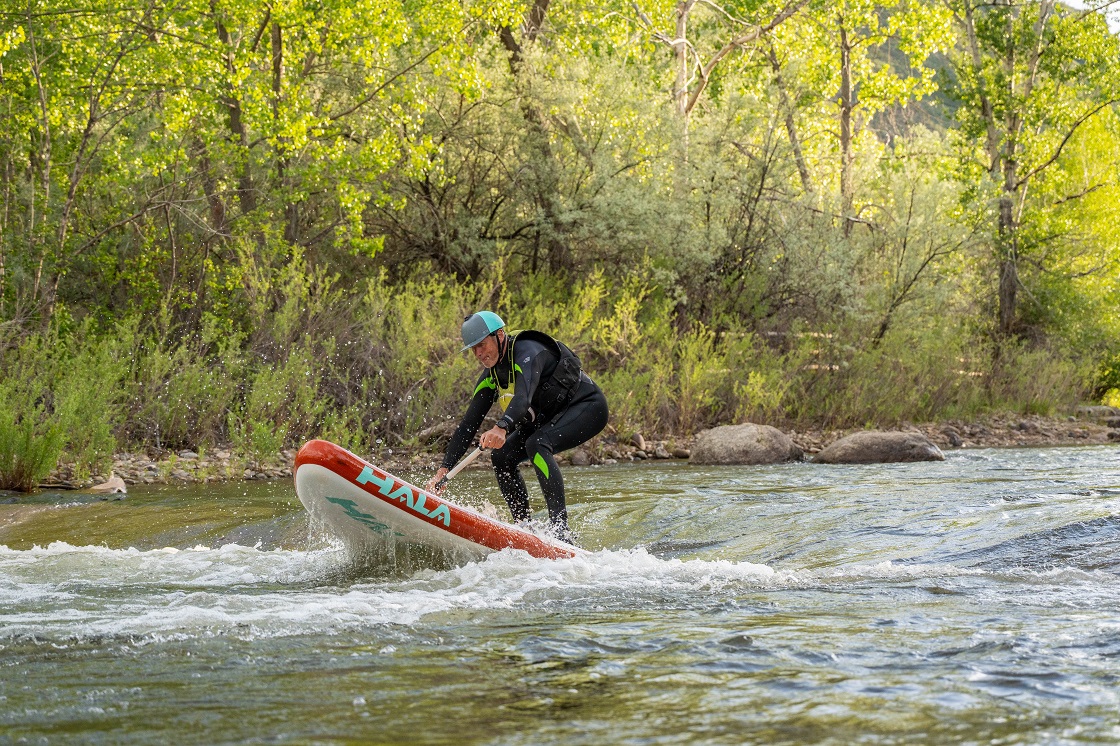
The Rado’s excellent stability, rocker profile, and ability to maintain its line give it great performance when paddling through most whitewater features.
Once you set your line through a wave or drop, the Rado’s length helps keep you moving forward while the rockered and pointed nose allows you to ride up wave faces and punch through holes or larger waves. The retractable stop-box fin system lets you paddle worry-free over shallow slides, ledges, and boulders.
While the lower maneuverability of the Rado compared to the Atcha or Radito means it’s not as well suited for tight, technical whitewater, the driving ability of the Rado makes it a great choice for big water paddling. Rather than getting turned with each diagonal and lateral wave, the Rado holds its line to keep you moving in the direction you want to go as you work through each rapid.
Construction Quality: 9.5/10
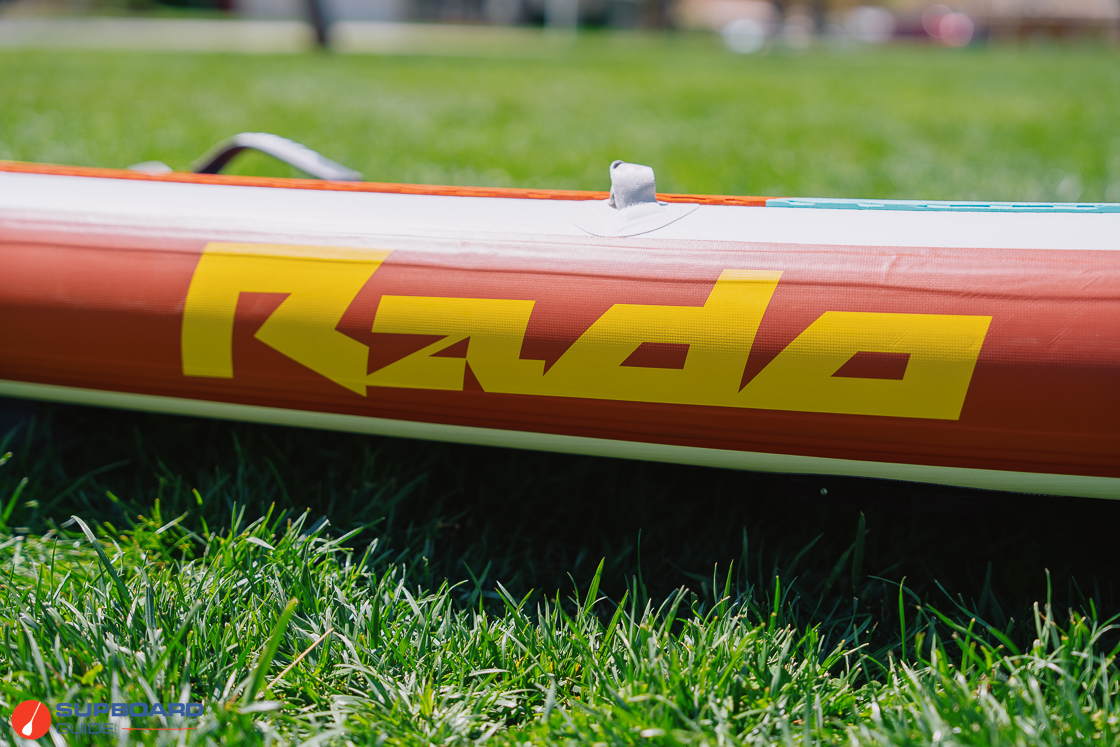
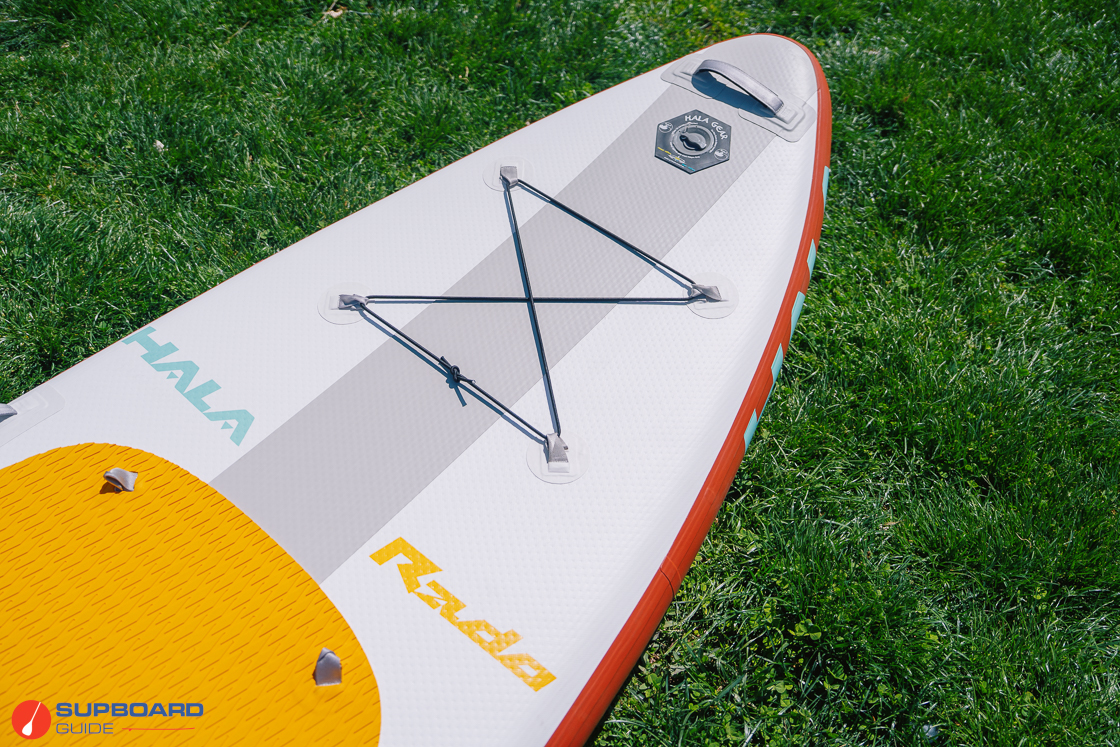
Hala has always been focused on building their boards with the highest quality materials designed for the job. By combining both time-tested materials and new technology, Hala has made the Radito a durable and effective whitewater board.
Inside the board
The drop stitch core uses a woven fabric base layer, but rather than opting for the ultralight cross-woven stitching, Hala uses a traditional V-stitching. It’s still extremely rigid and the slightly higher weight helps maintain your momentum while paddling through whitewater.
Top and Bottom Skin
The outer skin is a dual-layer fusion PVC laminate for greater rigidity and durability to combat river rash and the other hazards of whitewater paddling. They also install a wide PVC stringer on the deck to help stiffen the board further.
Rail construction
Hala heat-welds their rails for maximum durability and longevity. This process involves both a chemical glue and a mechanical bonding process for the inner rail. The outer rail layer is more reinforced PVC that wraps around the entire board and covers the top and bottom rail connections for even more protection.
Overall
The Rado is a noticeably heavy board – even more than other whitewater SUPs. But that extra weight means extra space and capacity for your overnight equipment and more momentum to carry you (and your gear) through the challenges of the river.
Board Stiffness: 1.34 ” bend (Radito)
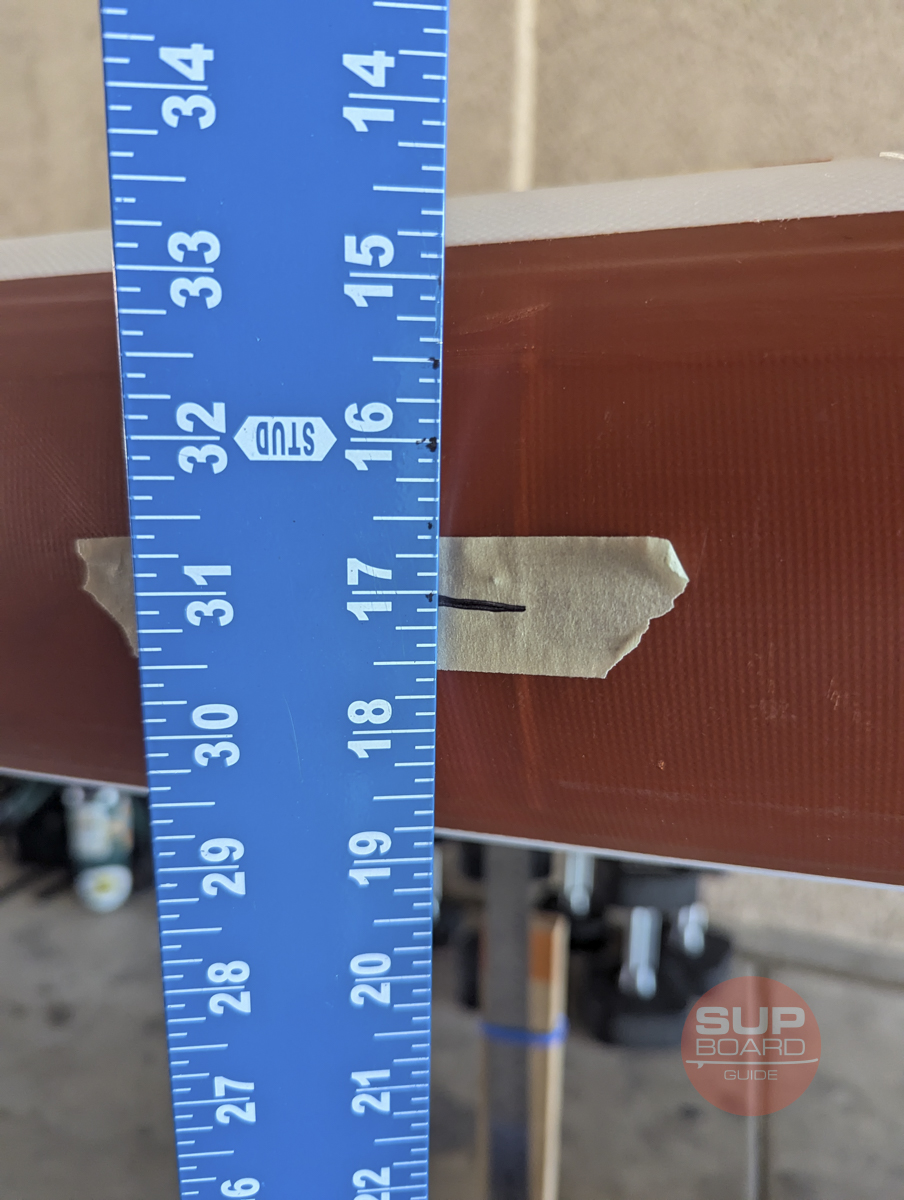
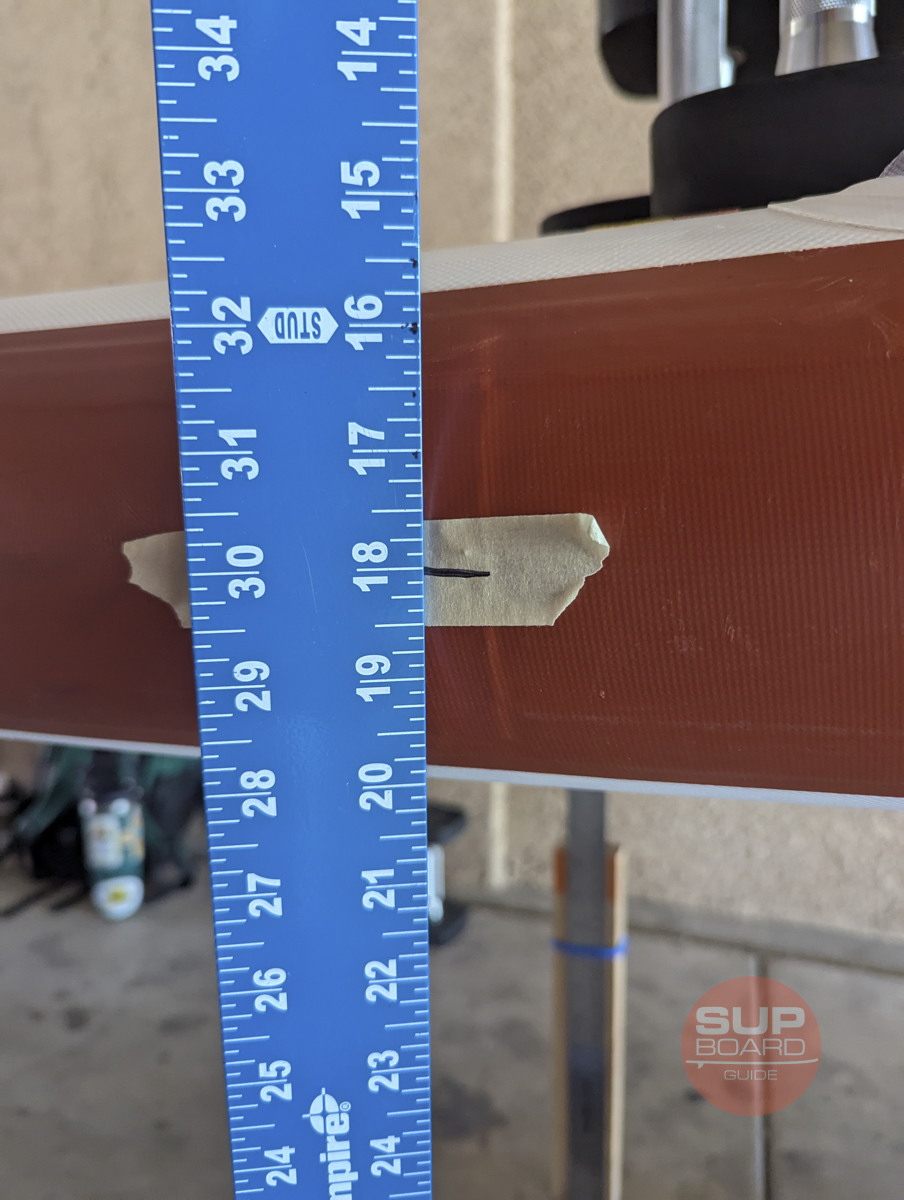
The Rao bent 1.0” in our deflection test with 150 pounds of weight. That is extremely stiff, but what’s even more impressive is how it feels on the water.
There is no noticeable bend or flex in the Rado while it’s on the water. Whether you are paddling through the flats or riding high over a massive wave train, the Rado stays rigid and stable under foot. I could jump on the board to make it flex, and while that’s a fun way to try some tricks at the whitewater park, it doesn’t affect the Rado’s performance on the river.
To ascertain the rigidity of each board we review, we use our own specific laboratory bend test process. The board is inflated to its maximum recommended PSI and then placed across two sawhorses positioned exactly 7 feet apart. We then measure the distance from the middle of the board to the floor. Then, we place a 150 lb weight on the middle top of the SUP, and measure the distance to the floor again. The difference between the two measurements shows the deflection, or ‘sag’, that the board has experienced due to the added weight. We have been reviewing the stiffness of boards using this technique since 2021 and while it isn’t an exact replication of the weight distortion that occurs when a rider stands on a SUP board in the water, it still gives a very useful comparative tool in determining the stiffness of the board’s construction process.
Features/Accessory Review: [9.5/10]
Features:

The Rado’s deck pad is made with a high density EVA foam with a diamond-groove pattern for excellent traction. There is a raised indexing pad in the center of the board near the tail to let you know where your feet are on the board without looking.
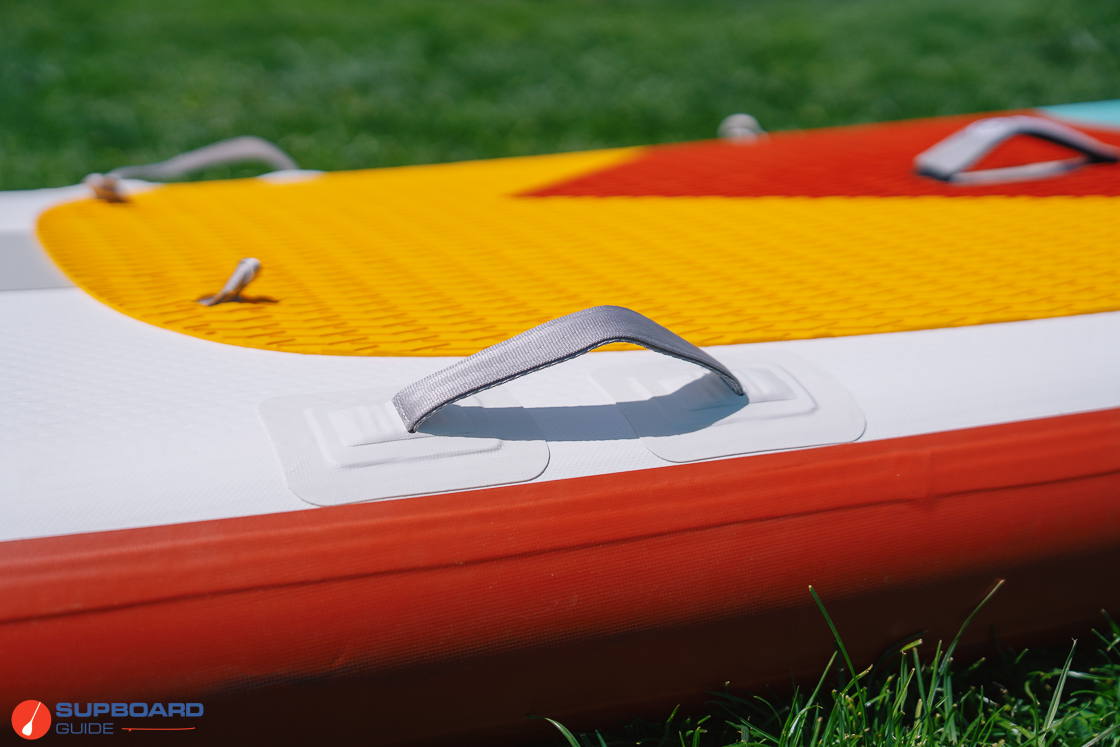
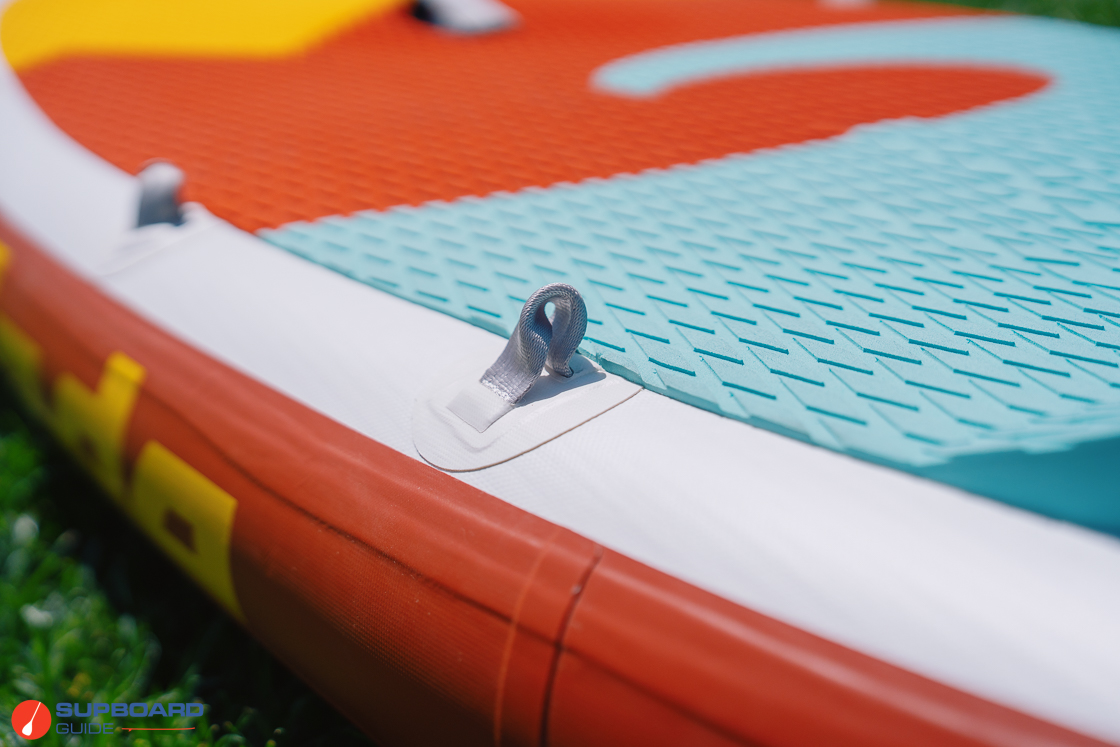
Hala uses nylon loops rather than steel D-rings for all of the rigging points on their whitewater SUPs. These loops are a safer option as they don’t hurt to fall on and are less likely to grab onto an object or finger compared to an open D-ring. The front cargo area is made with bungee cord tied between four rigging points. It’s the same size as the front cargo area on Hala’s other whitewater SUPs and can hold a small to medium size dry bag, but for an expedition-oriented board like the Rado I would like to see this area expanded to accommodate more equipment for longer trips.
There are also two grab handles located at the front of the standing area (in addition to the center, nose, and tail carry handles). These are great for holding on to your board while kneeling if things get a little too rough and for controlling the board on the water if you do go for a little swim.
The Rado has 6 more soft rigging points on the rear half of the board. These extra loops allow you to tie down large dry bags and other items for longer trips.
At the back end of the deck pad, there is a 1.5” raised kick pad to create a positive stopping point for your foot position and improve control when lifting the front of the board for quick pivot turns.
The very tail of the board ends with a reinforced D-ring for your leash (if you are using a quick release leash system – otherwise don’t use a leash on the river!) as well as a carrying handle. The inflation valve is at the nose of the board to make more room for the deck pad at the tail and make deflation and rolling easier at the end of the day.
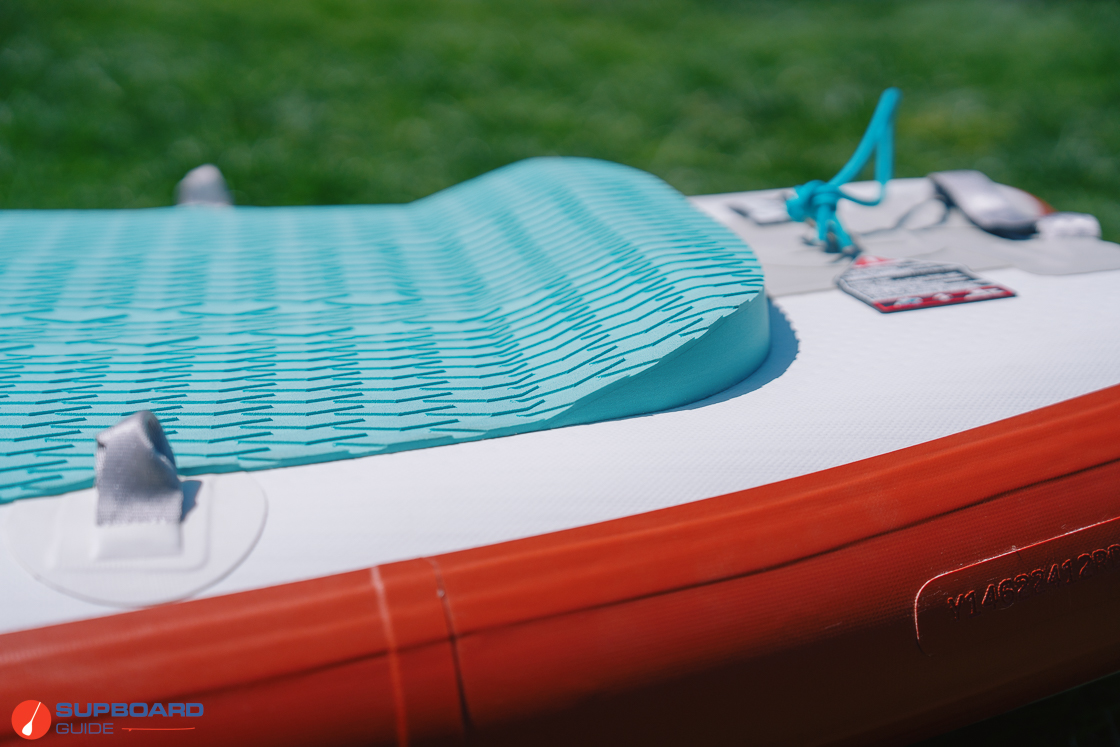
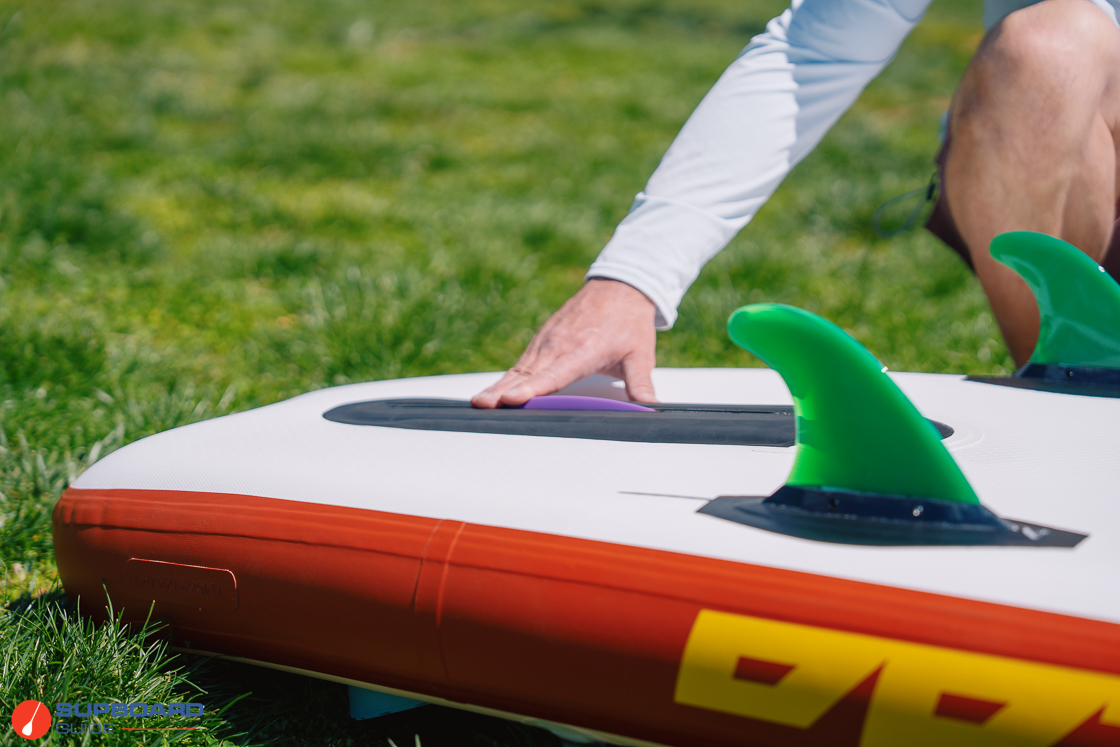
There are two FCS Two-Tab fin boxes and a hollow section in the board to fit the patented StompBox fin system under the tail of the Rado. Hala includes two 4.5” gummy fins for the side fin boxes, though they are compatible with hundreds of other FCS Two-Tab fins if you wish to use something else.
The StompBox fin system uses a separate plastic insert that contains a spring loaded system and the included 9” surf-style fin pre-installed. Before the board begins to pressurize during inflation, simply insert the StompBox fin system into the hollow section of the Rado, and a set of hard foam blocks and the pressure of the inflated board keep it securely in place. This allows the 9” fin to pivot and fold up into the board if it hits something under the water, and the spring pushes it back out after you’ve moved into deeper water.
I would like to see Hala include both a towing D-ring on the nose of the board and a GoPro or threaded accessory mount on the nose for future versions of the Rado.

Included Accessories:
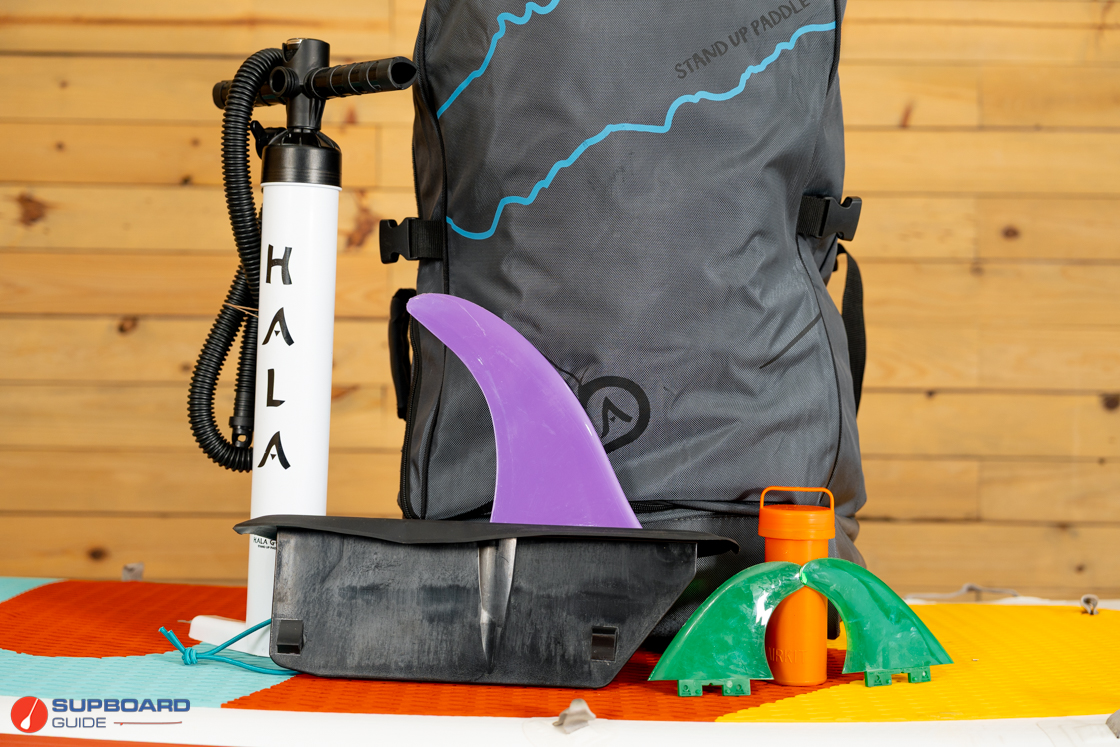
The Rado comes with a basic set of accessories to get you on the water, however you will need to add a paddle if you don’t have one already. Along with the Rado, you get a wheeled SUP backpack, double-action hand pump, StompBox fin system with 9” flex fin, two 4.5” FCS compatible fins, and a basic repair kit.
While not including a paddle would be a negative for a typical flatwater board, I don’t see this as a problem with a whitewater SUP. Most paddlers purchasing a whitewater SUP will already have a paddle they like. If not, Hala’s Grafik paddles are made for the river with a large 7-layer composite blade and carbon fiber shaft for durability and rigidity
Summary Review of the Rado Whitewater SUP

The Hala Rado has two primary purposes: a specialist paddle board for multi-day river trips, but it’s also a great choice for large paddlers (over 6’ and 250 lbs). The extra length of the board lets you easily carry your equipment for 2, 3, or more days on the water at a time while helping you speed through the flatwater miles in between the rapids.
If you have any questions or comments please let us know below!
SupBoardGuide
Latest posts by SupBoardGuide (see all)
- Best SUP Brands, 2022 - January 2, 2026
- Sea Gods Carta Marina Touring Inflatable SUP Review 2023 - January 2, 2026
- Sea Gods Acessory Review, 2023 - January 2, 2026


